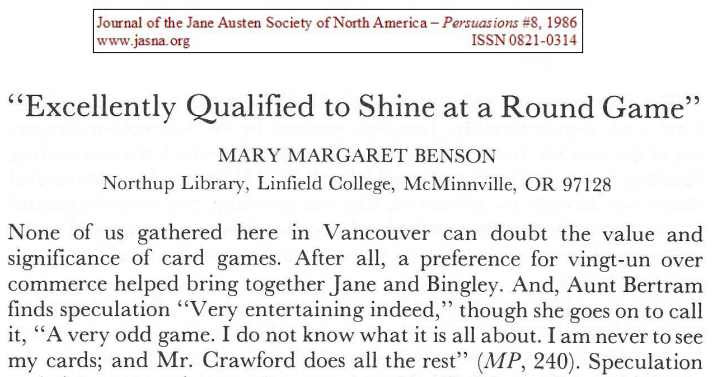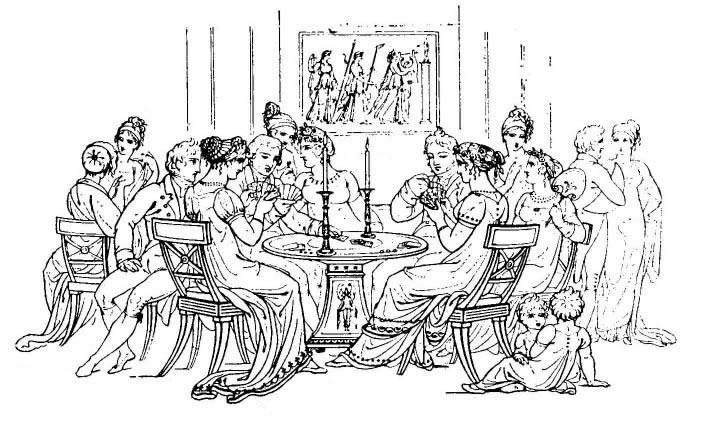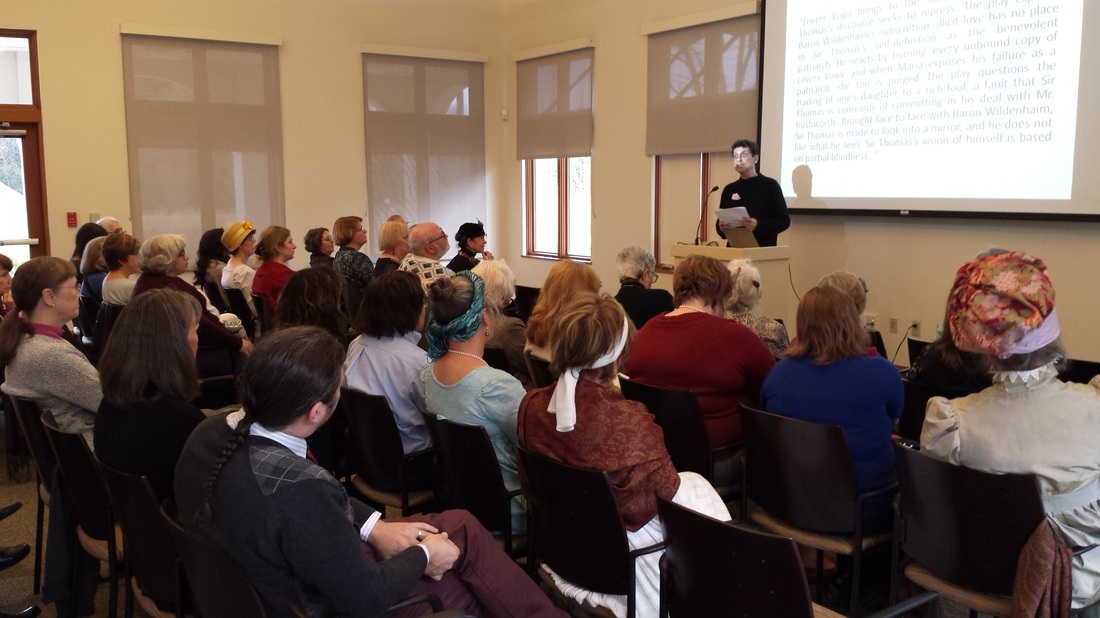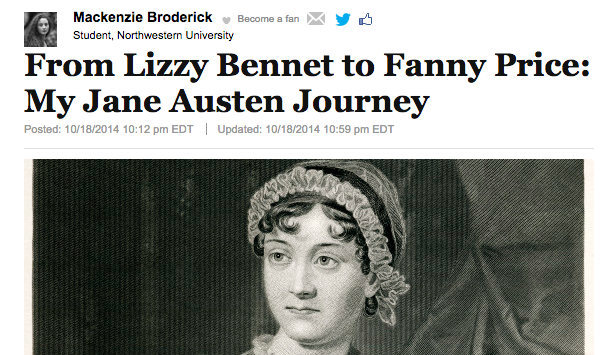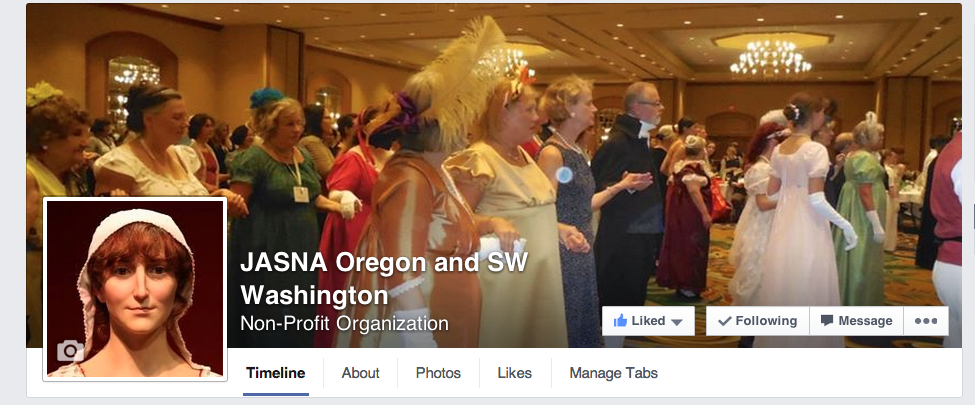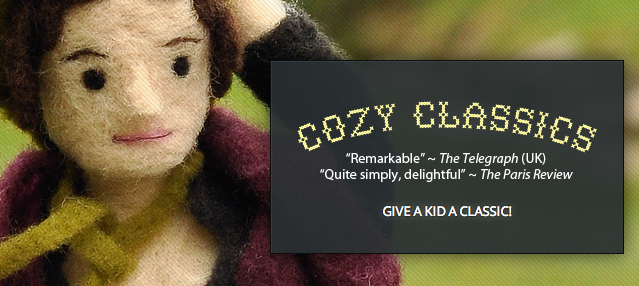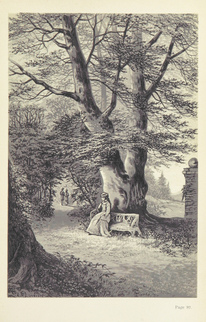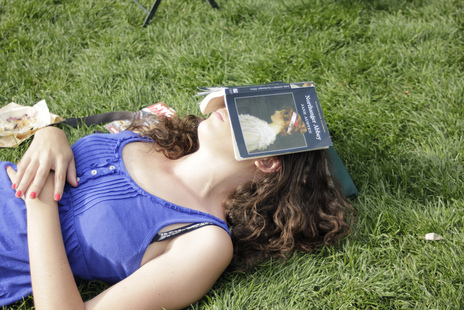An excerpt of the article below:
|
From the JASNA Persuasion archives, highlighted recently in last month's JASNA Update... an article from our very own Mary Margaret Benson! Her article, "Excellently Qualified to Shine at a Round Game", originally published in Persuasions, No. 8, 1986, "demonstrates how the ever-inventive Jane Austen transformed domestic card tables and casual card games into veritable microcosms of the domestic society portrayed in each of her novels." An excerpt of the article below: The full article is available to read and enjoy online at http://www.jasna.org/persuasions/printed/number8/benson.pdf, through the Persuasions archives on the JASNA website.
0 Comments
Longtime member Pauline Beard sent along the link to this introspective travel essay published last month in The New York Times, "Seeking Inspiration in Jane Austen's World." A perfect read to revisit old spots -- even if just virtually! :)
Elaine Blatt and Stephanie Fleming led a lively and fascinating discussion for the January reading group. The topic was "The First Janeites, Why & How They Read," and the topic naturally extended into how Jane Austen novels are read in wartime -- and how the novels incorporate (or don't incorporate!) war itself in their narratives or plots. Below are Elaine's and Stephanie's notes from their discussion prep, which they have graciously shared with the entire membership. They have also included extensive resources and links, embedded within the notes, if anyone would like to explore further. You can also read the discussion guide questions from Elaine and Stephanie sent prior to the reading group event in this post here at http://www.jasna-orswwa.org/home/discussion-guide-for-january-reading-group The Janeites During Wartime - Notes & ResourcesThe Janeites During Wartime
JASNA January 11, 2015 Elaine Blatt and Stephanie Fleming Background Most of our information came from these two sources:
War in Jane Austen’s Novels and Napoleonic War Background:
Essays/Blogs on Austen Novels and World Wars:
Bibliotherapy – WW1:
WWI Life: Publishers before/during war effort:
Who are the Janeites? From Wikipedia and Claudia Johnson: Janeitism actually began during the Victorian era - after the publication of Edward Austen-Leigh's A Memoir of Jane Austen in 1870. This spawned an era of commercializing Jane. The literary elite felt that they had to separate their appreciation of Austen from that of the masses. The term Janeite was originally coined by the literary scholar George Saintsbury in his 1894 introduction to a new edition of Pride and Prejudice. He declares himself a “Jane Austenite.” George Saintsbury’s generation is responsible for transforming Jane to a Legend. (Kipling later met with Saintsbury – maybe for background on his short story on Janeites?) The term Janeites, according to Austen scholar Claudia Johnson, is "the self-consciously idolatrous enthusiasm for 'Jane' and every detail relative to her". She goes on to say: “Criticism of Janeites mirrors to some degree criticism of Austen herself, that the enthusiasts' interests and Austen's focus herself are on the parochial or regionally social in a world that includes mass political movements, warfare, and the rise or decline of empire.” We found Janeites had distinct characteristics and interpretations of Jane Austen’s novels during different eras: Victorian Age, World War I & 2, Post War, 50s, 80s, and present day. Also, in each of these eras, Jane Austen has been hated or loved in part about what she did NOT write about. In the 19th Century, it was about passion of every sort not being included. In the early 20th Century, it was war. There is so much interesting information on Janeite’s in each of these eras, that we recommend delving further into this topic in future meetings. We decided to focus on the Janeites in the early 20th Century, and take a look at why Jane Austen was wartime literature. World War I & II Janeites: [In the early twentieth century, Janeitism was "principally a male enthusiasm shared among publishers, professors, and literati." (Wikipedia)} On the eve of WWI, Frederic Harrison’s 1913 letter to Thomas Hardy states: “A heartless little cynic was Jane, penning satires about her neighbors whilst the Dynasts were tearing the world to pieces, and consigning millions to their graves. A relation of hers was even guillotined in 1793, her brother was in the fleet that fought at Trafalgar - & not a breath from the whirlwind around her ever touched her Chippendale chiffonier or escritoire.” Harrison’s criticism is his perception of Jane’s indifference to war. In contrast, on the brink of WW2, in 1939, Laura Ragg writes: “Austen too lived through a long war and suffered the threat of invasion as well as anxiety for loved ones.” She also insists on Austen’s absorption in the everydayness of war and wonders whether Austen’s income from S & S was taxed – as her mother’s extra income would have been, given the war tax imposed from 1798-1815. Ragg finds that the mood of war is everywhere in Austen’s world and her novels: Austen knew the “stolid equanimity with which the English people supported 21 years of warfare with its attendant griefs and privations…. They suffered indeed from suspense, and from the heart-sickness of hope deferred to a degree which we can scarcely now imagine.” A. B. Walkley (avid Janeite), writing for Edinburgh Review (during WW1 era?): Austen is not sealed off from politics, but her novels permit us to believe that ordinary life can be lived despite it. Regardless of Harrison’s opinion, we know that Jane Austen was the cherished companion of the WWI generation – both at home and in the trenches. War Illustrated cited soldiers requesting Jane Austen’s novels for the front. The December 1915 issue published an article about how soldiers found solace from reading and needed books to be sent from Britain. It reveals the men had no appetite for “literary essays by literary men… what is wanted there is the friendly companionship of a good and kindly book to take the mind away from the contemplation of the terrible environment.” It reveals demand for romance and Jane Austen in particular. Kipling wrote “The Janeites” in 1917 - (http://www.kiplingsociety.co.uk/soldiers_fra.htm) Kipling treated Jane Austen on the front lines as a “universal truth” and where she was read not for escape, but for training for the demands of war. And like many British citizens, his family read aloud Jane Austen every evening to get through the war, and then through the mourning of the death of their son in the war. During WW1, Jane Austen’s novels were read for therapy, too. HF Brett-Smith, a former Oxford don, employed by the British Army to rate novels and poetry in terms of therapeutic efficiency and relief. In Brett-Smith’s “Fever Chart”, Jane’s novels were selected as the most effective form of treatment and recommended for the severely shell-shocked. (Today, bibliotherapists still recommend Jane Austen novels the most of all literature .) During WWII, Jane Austen’s novels were read in bomb shelters and in high demand by the armed forces. Sales of Pride and Prejudice tripled between 1939 and 1940, and were out of print by 1942 for the first time since her death because of paper restrictions. The Janeites of the time saw Austen not simply as someone we fight for, but someone we fight with. Jane Austen’s novels were seen as a reflection of English National Character with a premium placed on behaving well in times of duress (stiff upper lip, etc.). Men identify with the plight of female characters as well – it’s not about gender (like in Victorian times) – but about timeless human nature. Hugh Walpole, in discussing how the Great War left his generation with a “bitter cynicism” that transformed reading tastes, observed that while the “catastrophes and disappointments of the War left us with a deep contempt for what seemed to us a naïve and desperately complacent idealism of Victorian writers, it was very natural and significant that the one novelist of the nineteenth century who expressed in her work no philosophy at all, whose observation was ironic, whose genius was mainly in the humours of little things, was our own Jane Austen, who might, in spirit at least have belonged o our post-War time.” Claudia L Johnson goes on to say: “She is the contemporary of a generation whose ideals have blown up and respects the humor of little things and home things, not because they are darling, diminutive, or manageable, but more tragically because big bombastic things have been shown to be shams.” Last Sunday, Arnie Perlstein, J.D., JASNA AGM speaker and past Miami regional coordinator, presented a spirited talk on “The Five Other Shakespeare Plays Hiding (In Plain Sight) in Mansfield Park.” He has newly moved to Portland and joined our local region, and he received a warm welcome from the JASNA Oregon & SW Washington members who attended the December event to celebrate Jane Austen's birthday. Arnie also writes regularly about Jane Austen's "Shadow Stories" on his blog, Sharp Elves Society, at
http://sharpelvessociety.blogspot.com/, and his Twitter page at https://twitter.com/JaneAustenCode (@JaneAustenCode). His personal email address is also provided on his blog profile. Arnie would love to hear from any members who have follow-up questions, comments, corrections, etc. If there is enough interest (meaning, say, 4-5 people) who are interested in gathering informally at a Starbucks or the like on a periodic basis (monthly or every other month) to toss around Jane Austen's shadow stories with him, he would be very happy to take the lead on that, as long as it never conflicts with any of the chapters scheduled book group meetings or special events, which must come first. Please get in touch with Arnie directly if you are interested. Have you seen the personal essay, "From Lizzy Bennet to Fanny Price: My Jane Austen Journey" by Mackenzie Broderick, published recently on The Huffington Post? If the name sounds familiar, that's because Mackenzie won the JASNA National essay contest last year! Also, our region contributed $100 to her expenses to travel to last year's AGM to accept the award.
Her personal essay is a wonderful read, and there's even a photo of her "finest hour" at the JASNA AGM ball last year in Minneapolis. You might have already heard the news, but just in case, here's a quick update to let you know that we're now on Facebook! Click the image below or go straight to our Facebook page at https://www.facebook.com/JASNAOregonandSWWashington. We also have a new Facebook icon on the top of this home page's righthand column, which will also take you straight to our region's Facebook page. So how can you keep up with the updates on our region's Facebook page? If you have a Facebook account of your own, then just click the "Like" button at the top of the JASNA Oregon and SW Washington Facebook page (you can see it in the image above). You can also click the drop-down arrow beside the "Like" button and choose the "Get Notifications" option. This way, you will automatically get our region's updates in your personal Facebook news feed.
Also, all the updates on the home page of the region's website will automatically be posted to our Facebook page, so you can save time getting all your Jane Austen news and updates! :) 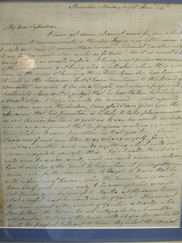 This link comes from member Debbie Guyol and is really interesting! The title of the article is called "Jane Austen's Collection of Critical Feedback From Her (Sometimes Harsh) Friends and Family" and is online here at http://alturl.com/ycvje. This is a transcript of JA's personal compilation of various readers' opinions of Mansfield Park. The manuscript of the same for Emma is also linked in the article, but not transcribed. Fascinating! "Cozy Classics" are a series of board books of classic literature, including Jane Austen's Pride and Prejudice and Emma. The photographs capture creative felted illustrations and characters. The series was created by twin brothers Holman and Jack Wang -- and each board book is only 12 words long! For more info online:
The NY Times site has a new "Janeiac Quiz" in order "to separate the Lizzys from the Lydias, the true devotees from the casual admirers." The 22-question quiz is interactive, so you can see your progress as you go through the quiz. It covers the Jane Austen novels, as well as adaptations, spin-offs, pop culture references, and literary criticism.
Take the quiz here at http://www.nytimes.com/interactive/2013/08/09/books/09austen-game.html |
JASNA ORSWWAWelcome to the web site of the Oregon & SW Washington Region of the Jane Austen Society of North America (JASNA). We are a friendly and active group dedicated to the appreciation of Jane Austen's life and works. Categories
All
Archives
July 2024
|
